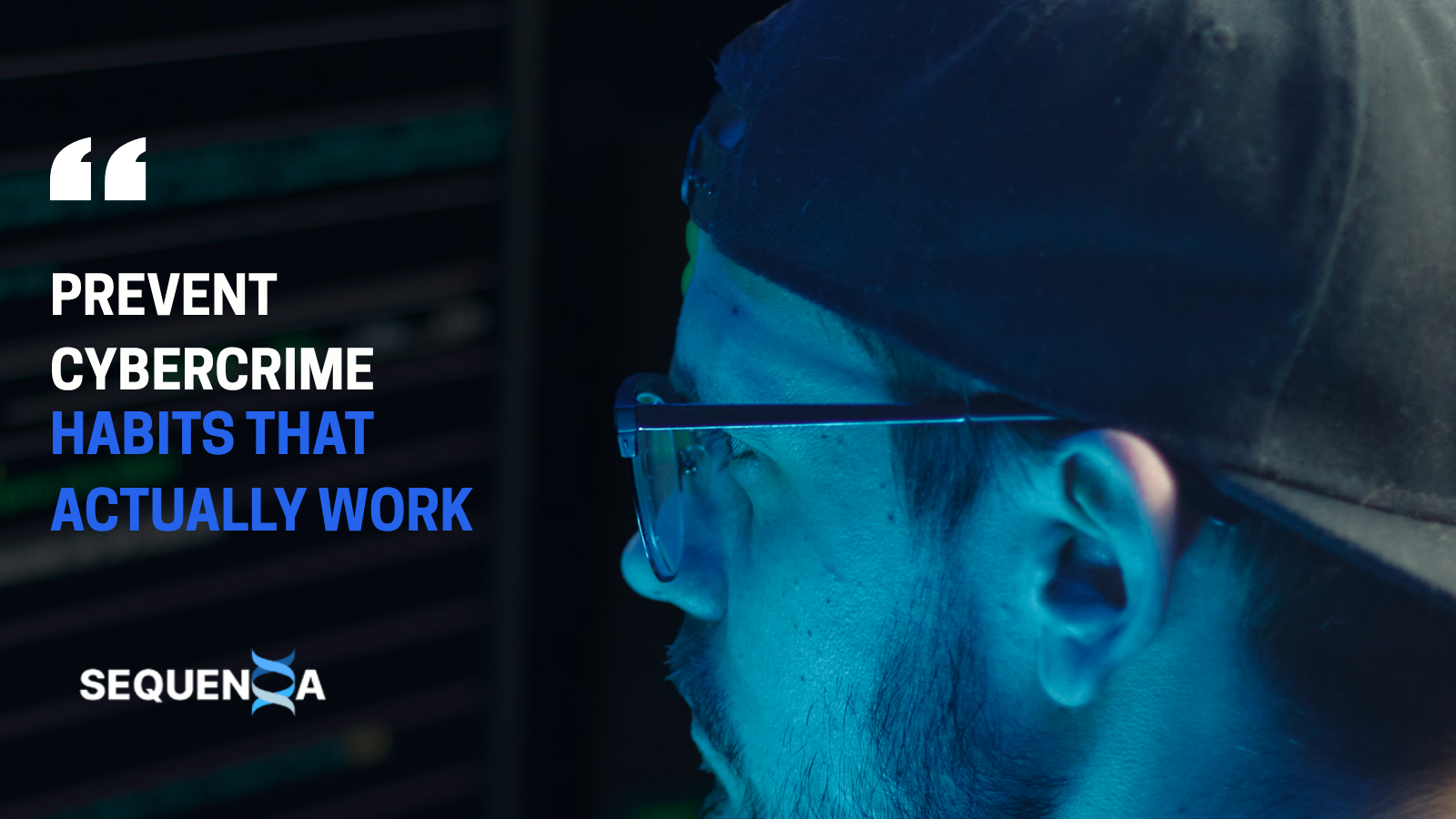Prevent Cybercrime: Habits That Actually Work

Cybercrime has evolved from isolated phishing emails to sophisticated attacks targeting everything from multinational companies to personal bank accounts. It affects individuals, governments, and businesses alike. As threats increase, it’s critical to understand how to prevent internet crimes and how to curb cyber crime at every level.
Key Forms of Cybercrime Include:
Phishing and spear-phishing attacks
Ransomware and malware distribution
Online identity theft and impersonation
Cyberbullying and cyberstalking
Financial fraud and cryptocurrency scams
In 2021, Colonial Pipeline, a major U.S. fuel supplier, was crippled by a ransomware attack, disrupting fuel supply across the East Coast and costing the company nearly $5 million in ransom. This incident highlights the urgent need to learn how can we stop cyber crime and how to avoid cyber crime before it escalates.
Understanding how can we protect ourselves from cyber crime and how to prevent cyber theft requires a shift from reactive to proactive behavior. The more we know, the better we’re equipped to implement solutions.
What new types of digital threats do you think are most misunderstood or underestimated?
Why Cybercrime Prevention Must Be a Personal Priority
Cyber threats don’t just affect corporations, they impact everyday people in highly personal ways. To truly understand how to prevent cyber crime and how to avoid cyber crime in daily life, individuals must view cybersecurity as an essential part of their personal safety.
Why It Matters to You:
Personal identity and financial data are hot commodities on the dark web, making it crucial to know how to prevent internet crimes and how to prevent cyber theft.
One compromised device can lead to multiple network breaches, showing the importance of understanding how can we prevent cyber crime in our homes.
Smart homes and IoT devices increase the number of potential vulnerabilities, which highlights how to curb cyber crime through smarter tech use.
A teenager in the UK once hacked into NASA's computer system, showing how even non-malicious actors can pose significant risks if proper controls aren’t in place.
"Everyone has a digital footprint. If you’re online, you’re a target, whether you realize it or not."
Are you overlooking signs of targeted attacks? Stay ahead with real-time threat analysis.
Practical Steps: How Can You Prevent Cybercrime Effectively?
Knowing how to prevent cyber crime doesn't require advanced technical knowledge, it starts with foundational habits that anyone can adopt. These practical measures help reduce your exposure to both common and sophisticated threats.
Key Practices to Adopt:
Use strong, unique passwords and a password manager
Enable multi-factor authentication on all accounts
Avoid suspicious links in emails and texts
Regularly update software and devices
Back up important data on encrypted drives
If you're wondering how to prevent cyber theft or how to protect yourself from cybercrime, these are your first lines of defense.
A small online retailer prevented a major breach by using two-factor authentication across all internal tools, after phishing emails attempted to gain backend access.
Ready to apply these practices in your everyday life? Discover how can we prevent cyber crime together.
Community and Collective Efforts in Curbing Cybercrime
Cybercrime is not just an individual problem, it's a societal one. Strong communities are more resilient against cyber threats.
Community Strategies That Work:
Digital literacy workshops for youth and seniors
Neighborhood cybersecurity watch programs
Peer-sharing of safe browsing practices
Reporting incidents early and often
In Singapore, public-private cybersecurity campaigns have helped reduce scam losses by 25% through education and hotline reporting.
80% of data breaches could be prevented with basic cyber hygiene and shared community awareness (IBM Security, 2023).
What could your workplace or community group do to improve its collective cybersecurity awareness?
Law Enforcement and the Role of Police Cyber Security Units
Police cyber security teams and cyber cell units are on the front lines of the digital battle against crime. Their effectiveness depends on public cooperation and timely reporting.
Law Enforcement Roles Include:
Cyber forensic investigations
Coordinating with international cybercrime databases
Protecting national infrastructure
Educating the public via outreach programs
India's cyber cell units have helped dismantle phishing rings targeting elderly citizens with fake insurance scams.
60% of cybercrime victims don’t report incidents, limiting the ability of law enforcement to respond (Interpol, 2022).
"Public trust and cooperation are crucial. We can’t stop cybercrime without active participation from every digital citizen."
Technology and Business Response to Cybercrime
Companies are no longer just targets, they’re also defenders. Forward-thinking businesses invest in cybersecurity as a core function, not an afterthought.
What Businesses Are Doing:
Implementing zero-trust security frameworks
Using AI to detect cyber threats in real-time
Training employees in secure digital behavior
Partnering with law enforcement and cybersecurity firms
Sequenxa recently deployed a decentralized AI security protocol that reduced unauthorized access attempts by 40% in six months.
88% of organizations worldwide experienced spear-phishing attempts in 2023 (Proofpoint Threat Report).
How seriously does your organization take internal cybersecurity training and threat response?
FAQs
1. How to protect yourself from cybercrime? Use strong passwords, enable multi-factor authentication, avoid suspicious links, and keep your software updated.
2. How can we protect ourselves from cyber crime as a community? Build awareness, educate your peers, report threats promptly, and engage in community digital literacy efforts.
3. How can we stop cyber crime in workplaces? Introduce regular employee training, enforce security policies, and audit system vulnerabilities frequently.
4. How can you prevent cybercrime when using public Wi-Fi? Use a VPN, disable auto-connect settings, and avoid logging into sensitive accounts on unsecured networks.
5. What role does police cyber security play in prevention? Police cyber security teams investigate digital crimes, recover stolen data, and educate the public about prevention.
Securing Your Digital Future
Cybercrime is a global threat with very personal consequences. From updating your passwords to supporting national cyber laws, everyone plays a role in this fight.
At Sequenxa, we believe that cybersecurity should empower, not intimidate. Whether you're a parent, a startup, or an enterprise, we help you stay secure in a connected world.
Want to take smarter steps toward cybersecurity? Let’s start a conversation about how Sequenxa can support your digital defense.
References
Cybersecurity Ventures. (2021). Cybercrime to cost the world $10.5 trillion annually by 2025. Retrieved from https://cybersecurityventures.com
Verizon. (2023). Data Breach Investigations Report. Retrieved from https://www.verizon.com/business/resources/reports/dbir/
Microsoft Security. (2020). Cyber Signals Report. Retrieved from https://www.microsoft.com/security/blog
IBM Security. (2023). Cost of a Data Breach Report. Retrieved from https://www.ibm.com/security/data-breach
Interpol. (2022). Global Crime Trend Summary. Retrieved from https://www.interpol.int/en/Crimes/Cybercrime
Proofpoint. (2023). Threat Report. Retrieved from https://www.proofpoint.com



